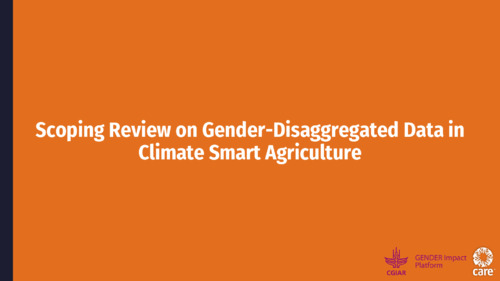Scoping review on gender-disaggregated data in climate smart agriculture
Abstract
Understanding the role of gender and other social relations in shaping adaptive and transformative capacities for building resilience requires assessing the gender and social-inclusion outcomes and impact of climate-smart agriculture (CSA) programming. CARE and IRRI, through the CGIAR GENDER Impact Platform, recently collaborated on a scoping review on genderdisaggregated data in CSA. The focus of this scoping review was to understand the extent to which genderdisaggregated data are available in CSA programming, identify existing gaps in the collection and analysis of this data, and suggest ways to bridge those gaps to reduce gender inequalities that may prevent women and girls from benefiting from CSA programming. The methodology involves a qualitative approach that uses a desk review of selected literature and key informant interviews (KIIs). The KIIs included a convenience sample of 11 informants representing multilateral agencies, an international NGO program, a local NGO program, government programs, a national agricultural research institute, an international research institute, and a private-sector program. Key findings indicated positive trends in the collection, analysis and use of gender-disaggregated data; gaps as a result of a lack of high-level commitment to seek gender equality and social inclusion; a lack of clear standardized indicators to measure impacts; lack of resources, capacity and time to effectively capture disaggregated data; and the need to creating an alliance of organizations to advocate for GESI integration. With the presentation of this learning and evidence, we intend stimulate discussion on the importance of inclusion of genderrelated outcomes and impacts in CSA.

